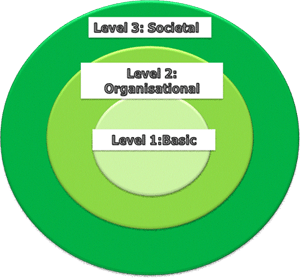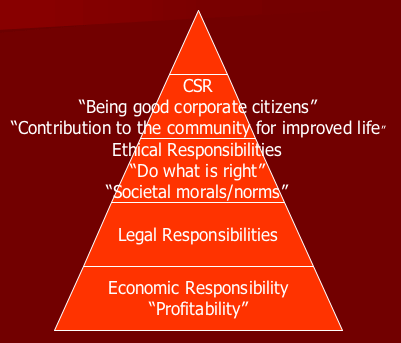Ethics & Corporate Social Responsibility
Dr. Iccha Basnyat
September 5, 2008
|
|
-- Milton Friedman, 1970
- What is CSR?
- Corporate Social Responsibility is a commitment
to improve community well-being through ethical business
practices and contributions of corporate resources
- -- There is no law, voluntary
- What is the motivation?
- How do we agree? Who sets the standards?
- -- Managing externalities
- e.g. McDonalds
- No clear cut answer: Does CSR increase the
bottom dollars?
- -- Beyond Community Projects
- Aligning of social and economic responsibilities
- Is it possible to balance the two
- PR function
- Meeting the Public >> technique to establish
relationship with the public through transparency
and accountability
- Moral agents >> public over personal
- That is:
- A business exists not only to generate profit
but to serve a social cause as well
- -- Should CSR be a practice or an organizational
philosophy?
- -- Proactive vs. Reactive?
e.g. Body Shop
- Evolution of CSR
- Committee for Economic Development (1971):
- Basic Economic Functions (growth, jobs)
- Economic function >> Changing practices/values
- Active responsibility to improving social environment


- CSR Today
- If individuals have rights and responsibilities why
not a corporation?
- Why shouldn’t corporations be “corporate
citizens”?
- -- 1990’s
- -- Coke, Microsoft, Exxon
- PR function for corporate citizenship:
- Not only for organizational benefit but also to
fight for social causes
- Balance between profit & public well-being
- Globalization
- “About 120 million children working
worldwide are … employed under dangerous,
unhealthy and inhumane conditions”
-- International Labor Organization
- “Snoopy, Winnie the Pooh and Hello
Kitty toys sold with McDonald's meals in
Hong Kong are made at a mainland Chinese
sweatshop that illegally employs child laborers
to package the toys”
– Sunday Morning Post
- CSR in Asia
- CSR in Singapore
- Corporate Citizenship
- Global 100
- “sustainable (corporations) in the sense that
they have displayed a better ability than most of
their industry peers to identify and effectively manage
material environmental, social and governance factors
impacting the opportunity and risk sides of their
business”
- CSR
- Can companies create a positive image through CSR?
- CSR Overview
- Organizational behavior is under scrutiny and
society is demanding accountability
- Transparency is becoming more and more important
- Organizations need to be good corporate citizens
- An organizations’ reputation dependent
on being regarded as trustworthy
- The ‘license to operate’ obtained
from society
- CSR: Cost & Benefit
- Skeptical of Motives
- Relationship between CSR and business success but
affect the image/reputation
- Continual understanding of societal norms/values
- Must balance between stakeholders & public
- Strong Brand position/Corporate image
- Increased ability to attract, motivate and retain
employees
- Decrease in operating costs
- Increased appeal to investors
Back to top
|
|
|

